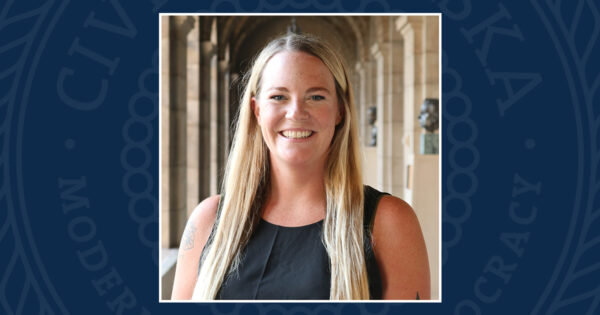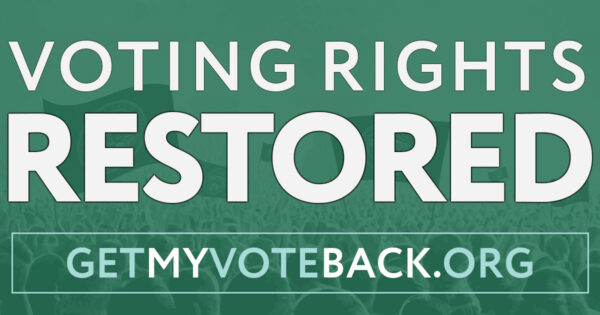On Nov. 6, 2021, Laurien Alexandre, the dean of Antioch University’s Graduate School of Leadership and Change, delivered the following address at the school’s commencement ceremony. In her comments to graduates, Alexandre discusses the inherent need for hope in the face of daunting or even overwhelming challenges. Dr. Alexandre’s address is reprinted with her permission.

I hoped we would be together today.
I hoped to send you off one last time.
I hoped that things would be so different by now.
And that’s today’s theme. Hope.
It would be an understatement to say there have been moments these past few years when I have felt hopeless, from the devastating impact of racism and nativism unfolding across the streets in every city, county, and country; to the existential threat of climate change as we watched interstates flood and towns burn; from the senseless individualism that is killing thousands a day in what is now a largely preventable plague; to conspiracy-inspired lies fueling a fundamental breakdown of our systems of government and community. It’s overwhelming.
 Our standard refrain, “What Would Horace Do?” feels very Antiochian but so outdated and woefully inadequate in the face of all this. I need to hope for something better. And that’s what I want to talk about today, radical hope. My current journey into radical hope began with Dread. Seriously. David Theo Goldberg’s new book, Dread: Facing Futureless Futures, set me on an intense four-month journey looking for hope in all the right places. I want to share what I’ve learned and the ways in which hope is embedded throughout our program and the life paths of our graduates.
Our standard refrain, “What Would Horace Do?” feels very Antiochian but so outdated and woefully inadequate in the face of all this. I need to hope for something better. And that’s what I want to talk about today, radical hope. My current journey into radical hope began with Dread. Seriously. David Theo Goldberg’s new book, Dread: Facing Futureless Futures, set me on an intense four-month journey looking for hope in all the right places. I want to share what I’ve learned and the ways in which hope is embedded throughout our program and the life paths of our graduates.
First, as a topic of study, I learned there are all kinds of hope – anticipatory and subversive hope, social and critical hope, present hope, educated hope, profound hope, good and bad hope, simple and complex hope, and so on. Anthropologists talk of ‘spaces of hope,’ linguists of ‘vocabularies of hope.’ I read philosophers old and new, theologians of every stripe, educators, psychologists – all of whom have unique ways to look at this concept called hope.
And then there are poets. Feminist activist and poet Adrienne Rich asked, “What would it mean to live, in a city whose people were changing each other’s despair into hope?” What would it mean to be on the last page of the end of despair?”
Most of the time we think of hope in a privatized way. Like, “I hope I win the lottery,” which is unlikely, improbable, and all about me. Or like, “I had hoped we would be together today.” But if all those people who can, don’t get vaccinated or wear masks, then we won’t be coming together no matter how much you and I hope for the best.
The problem is that if hope only dwells in this personal space, it removes all responsibilities from the larger society. We can hope all day for health care for all, a basic living wage, a level-playing field no matter one’s ZIP code … you get where I’m going. It is just sort of a naïve optimism.
And while I believe it is good to be optimistic, it isn’t enough, and I’m not naïve. In the words of Cornell West, “I am in no way optimistic but I remain a prisoner of hope.”
Detaching hope from the wider world lets those who hold power off the hook, and depresses those without a chance, you know, not a hope in the world. So, if it’s not just wishful thinking, what is it? Hope is the precondition for individual resilience and the inspiration for social struggle. I’m dating myself, I know, but I remember when civil rights icon, the Rev. Jesse Jackson, called out to the rainbow coalition to “Keep Hope Alive” by recognizing “our capacity to act and unite for the greater good” using “hope and imagination as weapons of survival and progress.”
“Keep hope alive,” he preached. Keep on dreaming. Keep on fighting. Twenty years later President Obama campaigned on the audacity of hope. We thought we had come far. In some ways we did. But there were profound limits.
The great legal scholar Derrick Bell, who is considered one of the founders of Critical Race Theory, and I might add, husband to a program alum, talked about the intractable permanence of racism and the complicity of liberalism, when he noted of the Obama victory, “So many great moments promised much and, in the end, signified nothing except that the hostility and alienation toward black people continue in forms that frustrate thoughtful blacks and place the country ever closer to its premature demise.”
Still, in the face of that, Derrick Bell never lost hope.
But is that where we are, a premature demise? So many feel hopelessness. I do. Something is so terribly wrong in America. Here, in one of the richest countries in the world, millions are unhoused and malnourished, cramming into no-longer hidden nooks on every street corner across the land. We’re seeing attacks on voting rights to disenfranchise the young, those of color, progressives, that new majority, by any unconstitutional means necessary.
I could go on but that will only get me too depressed. It feels hopeless. Will it never end? And that’s where radical hope comes in. Radical hope is the counterweight to radical evil.
One of my favorite philosophers, Hannah Arendt, in her brilliant post-mortem on World War II and the reckoning with totalitarianism said that it was precisely the world’s descent to such depths that led to new possibilities so that we would never allow ourselves to return to that abyss again. Radical evil is countered by radical hope with its strength to face the future. That Never Again or that Build Back Better are a call to action – we will rise whenever it seems most impossible.
Even in the darkest times, many choose to act and speak and write. And organize and dissent and disobey. Radical hope motivates radical action to make the world freer, more equal, more democratic, more livable. Radical hope is the basis for acting together. More than a personal mood or private feeling, it is the basis of collective social and political action. It is the we as in we shall overcome, it is the we as in we the people, and it is the we in we are in this together.
Radical hope is ‘aimed’ hope, directed to what some might consider a utopian future, based on an understanding of the past and a critical awareness of the present. The past is considered a resource for the present and for the construction of an imaginative future.
I’m not a psychologist, nor a philosopher, nor a preacher nor a poet. I’m a higher-ed administrator running a doctoral program in leadership and change. So, what does radical hope have to do with an Antioch education? Paulo Friere, renowned Brazilian educator, writer, and global activist tells us, “We need critical hope the way a fish needs unpolluted water.” Basically, we can’t live without it. We cannot improve the world. We cannot so much as start the struggle for justice without hope.
Naturalist Jane Goodall calls hope a human survival trait and says without it we will perish.
Radical hope is the counterweight to radical evil. One of the tasks of progressive educators, like those of us here at Antioch, is to create opportunities for students to hope and act, no matter what the obstacles may be. It’s something called pedagogies of hope. From bell hooks in Teaching Community: Pedagogy of Hope to David Hicks in Educating for Hope in Troubled Times or Keith Gannon’s Radical Hope: A Teaching Manifesto, progressive authors explore ways to prepare students to navigate uncertain futures with hope.
Our students inquire into the ‘wicked’ problems of their organizations and communities and explore practices to redress inequities in transformative and not formulaic ways. They develop a recognition that something is missing.
… The how is that radical hope doesn’t go it alone. While there is of course individual achievement, the hope to get one’s Ph.D., it isn’t an isolated desire. We nurture learning communities of care, our version of rainbow coalitions, that practice mutual accountability and dialogue across difference. Rather than isolated students competing for the star faculty member’s attention in order to be the anointed mentee as is common in many doctoral programs, we position individual journeys within cohorts of peer learners.
I hadn’t really connected this way of learning with the theme of today’s talk until now. There’s something powerful about finding one’s best self within community, a rainbow community like ours. In fact, not only does that cohort mutuality and accountability improve individual graduation rates, such that they are well above the national average, but it also builds a bold fellowship of kindred spirits with diverse experiences and unique lives committed to futures of justice.
Let me underscore the obvious. We do not always agree on the past, nor frame the present the same way nor necessarily have the same imagined future. Yes, we are drawn to Antioch by its mission but we come as Black and brown and white and mixed, and straight, gay and nonbinary, as community organizer and as CEO, as single mother and as grandparent. As mid-career professional and encore career retiree. We see the world differently and we live the world differently. We challenge each other. We often sit with discomfort. Even as good-willed people, we sometimes lose patience and stop listening. How can she really think that? How can he not see his privilege? Can they really believe that ____?
I think we need to recognize that the very act of conversation in our highly polarized world is a radical act, often referred to as deliberative dialogue, which requires conversations imbued with collaboration, courage, and constructive contention.
Trying to bridge divides must start with truth. We must forcefully reject lies. Once there is agreement on basic facts– not delusion – there is an opportunity for conversation to brainstorm options, critique alternatives, and dissent productively. We’re going to have to figure this out somehow in some way and we don’t have a lot of time. It feels daunting. And then, I turn to our learning community and I find hope. I see by your work and your commitment that we can do it and it is worth fighting for. Then there’s the who and the why.
… One of our program’s goals is “to teach and train our students to be public intellectuals for the common good.” I want to rename the program goal “To teach and train our students to make noise for radical hope.” Rebecca Solnit, one of my favorite social commentators, says “Hope is not a lottery ticket you can sit on the sofa and clutch, feeling lucky. It is the ax with which you break down doors in an emergency.”
Name the emergency. Climate change. Pandemic. Authoritarianism. Racism. Name it. Radical hope is our ax and as scholar-practitioners, we use our words and our writings and our actions.
So, here are my last words to you today, my dear radically hopeful graduates. You have a special responsibility to ‘speak for hope.’ Radical hope.
Publish. Broadcast. Podcast. Post. Blog. Vlog. Organize. Take seriously your voice for the common good. Be bold. Not Silent. Reinsert hope into public discourse, organization meetings, classroom conversations, community gatherings. Call for radical transformation and provide both the evidence and the imagination for it. Speak out with your passion for justice.
Win those victories for humanity. That’s what Horace would do. We are together today. With you, I find hope.



